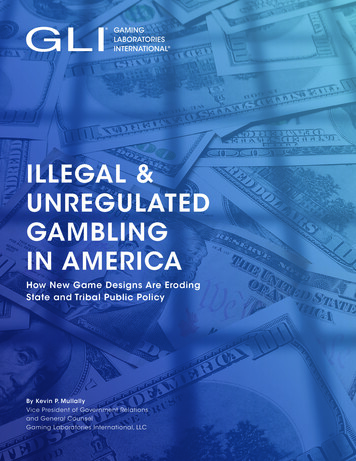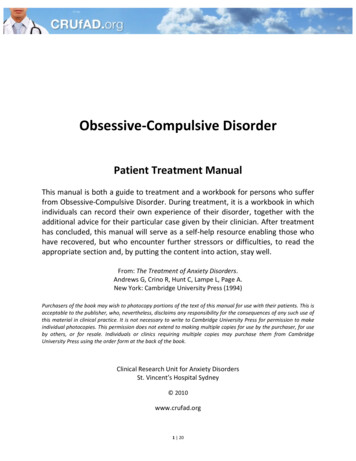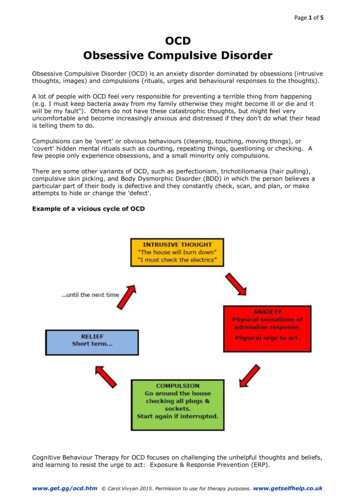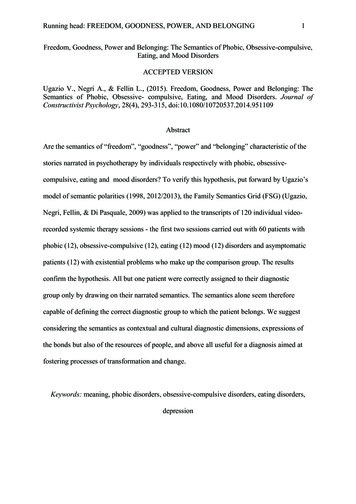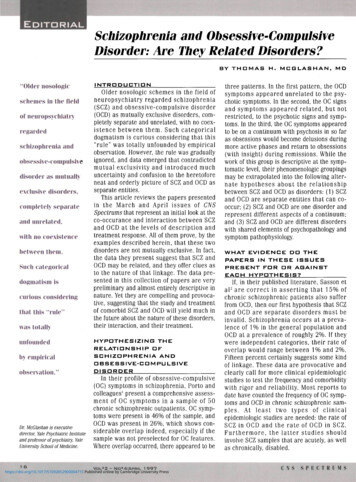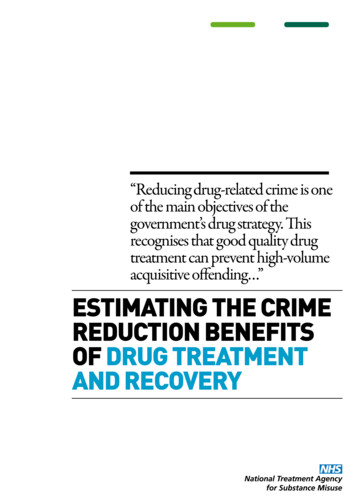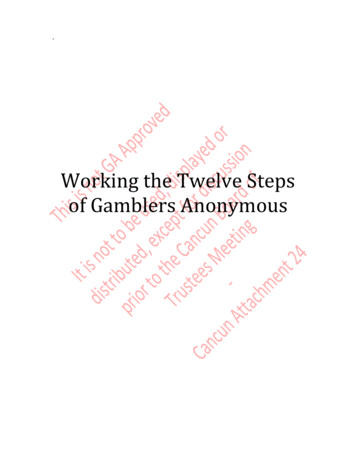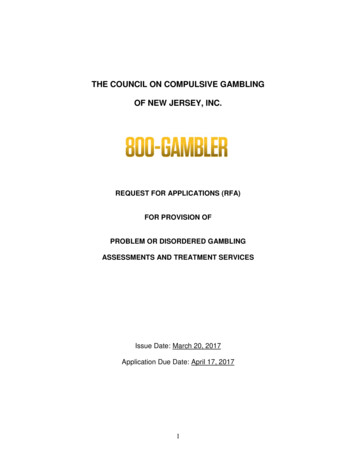
Transcription
THE COUNCIL ON COMPULSIVE GAMBLINGOF NEW JERSEY, INC.REQUEST FOR APPLICATIONS (RFA)FOR PROVISION OFPROBLEM OR DISORDERED GAMBLINGASSESSMENTS AND TREATMENT SERVICESIssue Date: March 20, 2017Application Due Date: April 17, 20171
1.0 Executive SummaryThe Council on Compulsive Gambling of New Jersey, Inc. (CCGNJ) is seekingapplications for providing problem and disordered gambling services,evaluations, assessments, treatment and awareness campaigns. As a result ofonline gambling offered to the general public in New Jersey which began inNovember, 2013, coupled with an increase in demand for services for Problemand Disordered Gambling, CCGNJ is looking to increase the workforce andavailability of options in the field of gambling addiction. The Council is seekingapplications for the following areas: Residential services for Gambling Addiction Outpatient services for Gambling Addiction Evaluations, Assessments and Screenings for problem and disorderedgamblers and/or family members/significant others.1.1 Purpose and IntentCCGNJ will issue fee-for-service grants to selected agency and individualproviders who can furnish treatment services and/or assessments to problem ordisordered gamblers and/or their family members/significant others and meetspecified criteria outlined herein. Funding for these assessment and treatmentservices comes to CCGNJ through the NJ Department of Human Services,Division of Mental Health and Addiction Services, and is subject to that agency’spass-through requirements. Additional funding from other sources may becomeavailable in the future and may be used to supplement awards made under thissolicitation; however, no guarantees are made as to availability or amount ofsuch funding. The parties agree to the fees listed herein.1.15 NeedsCCGNJ is especially interested in hearing from any provider ororganization with an interest in providing problem or disordered gamblingservices in underserved regions of New Jersey, including but not limited toBergen, Essex, Union, Sussex, Warren and Hudson counties or for underservedgroups such as Asian Americans, Hispanics/Latinos, African-Americans, olderadults, adolescents, young adults, veterans, disabled persons and families.1.2 Overview of CCGNJCCGNJ is a not-for-profit 501(c)(3) corporation based in New Jersey thatwas established in 1982 and is a local affiliate of the National Council on ProblemGambling. CCGNJ conducts education, prevention, outreach and referralservices for people affected by problem or disordered gambling throughout thestate. CCGNJ is neutral on gambling; it does not oppose it or support it. Its2
mandate is to advocate for problem or disordered gamblers in New Jersey andfor those who are affected by their gambling, i.e., family members/significantothers.The Council owns and operates the 1-800-GAMBLER Helpline which isavailable 24 hours a day, 7 days a week to gamblers, their families/significantothers and persons seeking information on treatment and other resources. TheCouncil also created and maintains the www.800gambler.org website while alsomanaging and overseeing a limited network of problem or disordered gamblingtreatment service providers at various locations across the state.1.3 EligibilityThis solicitation is open to public or private organizations and independentpractitioners that meet the following requirements:Applicant applying for funding to provide counseling services in a private officemust be independently licensed, need to present licenses or registrationsentitling it to do business in New Jersey and have an established presence in thestate.Agency applicants must be currently licensed by DHS/DMHAS. All applicantsmust possess a Bachelor’s degree in a behavioral science and must submitdocumentation of having completed the 30-hour problem gambling training.Applicants with a Bachelor’s degree may provide gambling prevention educationservices including community awareness and/or limited treatment services underproper supervision while working within an agency. Additionally, all applicants arerequired to provide documentation of the number of hours they have beensupervised while working with disordered gamblers and/or family members/lovedones and actively be working towards obtaining the International CertifiedGambling Counselor (ICGC) certification. Within a year from being part ofCCGNJ’s Network of Treatment Providers, the clinician must have passed thegambling examination and obtained their ICGC credential. Applicant must demonstrate that it meets all agency and/orindependent practitioner criteria. Applicants that do not meet the above eligibility criteria, as of thedate of submission of the grant application, will not be consideredeligible for review.3
1.3.1 Certification of Eligibility:The applicant’s proposal should include documentation of all licensesheld, including the type and class for each site at which services areproposed. For license applications in process, applicants should describeactions already taken and expected approval dates for securingnew/renewal licenses.The applicant must provide the following additional documentation, asrequired by the Division of Mental Health and Addiction Services:Completed Certification of Debarment and SuspensionCertification Regarding Lobbying1.4 Amount of AwardAwards will be considered on a case by case basis as a result of thissolicitation. Successful applicants will be reimbursed through a fee-for-serviceContract Agreement with CCGNJ. Funding levels may vary and are subject toState appropriations and funding agency approvals. Individual award levels mayvary, based upon differences in client volumes, levels of service to be provided,and number of geographic areas to be served.1.5 Project PeriodThis will be a twelve (12) month grant beginning July 1, 2017 and endingJune 30, 2018 with an option to extend, pending the availability of funding.CCGNJ may set financial caps on services to be rendered by Grantee in order toensure availability of services throughout the entire project period; such capsshall be established as of November, 2017 and March, 2018. Continuation of thefunding beyond June 30, 2018 is not guaranteed and will be contingent uponperformance, availability of funds, and the continued relationship betweenCCGNJ and Division of Mental Health and Addiction Services as to sub-grantsfor treatment. Contract agreements may be extended for up to two (2) additionalperiods of one (1) year each at the option of CCGNJ, subject to approval by theDivision of Mental Health and Addiction Services.2.0 Work Required By The GranteeGrantees will be expected to provide problem or disordered gamblingassessment and/or treatment services at individual, family, and group levels.Proposals that include services to address a continuum of client severity levels or4
multiple levels of services are encouraged, but applicants may apply to provideassessments only or to provide a single level of treatment service.CCGNJ encourages applicants to submit proposals to provide services inmore than one county and at more than one site. Applicants that have previouslyreceived awards from CCGNJ are not restricted to their current sites and maypropose satellite or substitute locations that offer treatment or assessmentservices on a regular schedule or by appointment.2.1 Service Definitions and RequirementsGambling Assessment includes the administration of assessment tools todetermine whether an individual has a gambling problem or a familymember/significant other is affected by someone’s gambling addiction. Suchassessments will generally be limited to a single session and result in referral(s)for further evaluation, treatment, mutual aid groups or support services, asclinically indicated.Gambling Treatment refers to individual outpatient services, grouptreatment, family treatment, or residential services afforded a gambler and/orfamily member/significant other.2.2 Providing Direct ServicesThe applicant will be capable of providing some, if not all, of the servicesdirectly, as noted above, to program participants. Notwithstanding this, theapplicant may propose to use consultants and/or intermittent employee staff inproviding services, provided that such persons possess required credentials andthat the service programs otherwise meet the requirements described in thisRFA.2.3 Key FunctionsThe major functions which the successful applicant under this RFA will beexpected to perform are: to provide gambling treatment services (includingassessments) to individuals experiencing gambling problems and/or to the familymembers/loved ones of individuals suffering from gambling disorder.2.4 PerformanceThe applicant agrees to cooperate with the CCGNJ Program Monitor(s)with respect to review and auditing of files, monitoring of adherence to contractrequirements, documentation of financial controls and auditing of financialcompliance.5
The applicant agrees to complete the NJGEARS (MIS) data and forms forall clients seen pursuant to this grant and all clients/family members/significantothers receiving treatment for gambling addiction whether utilizing grant funds ornot. For clients who choose to pay, NJGEARS forms will be completed and hardcopies will be maintained in clients’ files but not entered into the NJGEARSsystem. For clients who choose to pay for all treatment costs, perhaps notwanting their insurance carrier to be contacted, NJGEARS forms will becompleted and hard copies will be maintained in clients’ files but not entered intothe NJGEARS system.The applicant agrees to provide all equipment, supplies, staffing andfacilities necessary to conduct the proposed program of services.The applicant agrees to cooperate with CCGNJ in any needs assessmentor planning activities associated with treatment service enhancement or qualityimprovement initiatives.The applicant agrees to enter a HIPAA Business Associate Agreementwith CCGNJ and to implement all related privacy protections.3.0 Application RequirementsInterested applicants must submit a Project Narrative detailing how theywould carry out the requirements in Section 2 above. To facilitate review,applicants are asked to assemble their application packages in the order of thisoutline. All items listed below are required, unless clearly marked “optional”.3.1 Cover Letter (optional)3.2 Project NarrativeA narrative description of the program is required and must be no morethan ten (10) pages. Any pages over this number will be discarded prior toreview. The numbers of pages for each of the sections within the narrative aresuggestions only; any of these may be shorter or longer if the total narrative doesnot exceed ten (10) pages. The narrative should be written in the form of acoherent essay, with headings and subheadings (not a series of disconnectedanswers to questions). This narrative will be the primary document thatreviewers will use to judge the application. It should be written with economy,great care and attention to all the requirements listed in Section 2 above and theitems listed herein. It should be designed to thoroughly acquaint intelligent, welleducated reviewers who are entirely unfamiliar with the applicant organizationand with the way it plans to carry out required activities.6
The narrative must address each of the issues raised in Section 2 above.It must describe, in the Required Organizational Features Section below, how itmeets the requirements set forth in the above Section 1.3, Eligibility. It shoulddescribe any experience the applicant may have had that would bear on its abilityto fulfill the program requirements, indicate what resources, tangible andintangible, the applicant would bring to it, and present an argument as to why itshould be chosen. Further, the application should show how many people will dothe work, explain who they are and how they qualify for the functions they willperform, show how they will be organized, describe any important timelines orphases of the operation and document the eligibility of the applicant to receive anaward.The following is a strongly suggested format for the narrative:EXECUTIVE SUMMARY (1 page)APPLICANT ORGANIZATION (1 page)-Required Organizational Features-Prior Experience-Resources AvailableCOMPLIANCE WITH SCHEDULE A ELIGIBILITY (2 pages)COORDINATION OF SERVICES-Describe (1 page)Discuss linkages and services with the following, as applicable:-Drug Courts-Other Criminal Justice/Probation/Parole/Corrections-DWI/ Intoxicated Drivers Resource Centers-Drug and Alcohol Treatment Programs-Mental Health / Health Services-Senior Services-Homeless Programs/Housing-Domestic Violence Programs-Veterans Programs-Gamblers Anonymous and Gam-Anon-Other mutual-aid fellowships-Alumni groups7
Applicant may incorporate existing agency literature descriptive ofcoordination services.TREATMENT SERVICE PROVISION (2 pages)Please discuss each service you are proposing to render in any ofthe following areas and indicate if these are existing or new levelsof service for your agency (agencies may propose one or more ofthe listed services):-Assessment/Evaluation services-Residential services-Gambling specific programming- Integration with other programming-Outpatient-Individual, group, family treatment-Specialized ProgramsDiscuss agency procedures and policies applicable to programsand services you are proposing to provide through this eduleforreview/update), extension requests beyond normal levels ofservice-Staff back up protocols-Clinical recordkeepingACCESS CAPABILITY (2 pages)-Regions and Counties proposed to be covered-Locations - on-site and off-site (list all addresses)-Priority populations-Agency’s scheduling procedures-Sliding fee scales/Co-pay requirements-Approved insurance affiliations and participations-Marketing of your agency’s programApplicants are urged to think outside the box and providepossible ways to bridge the existing treatment gap. Services thatare co-located or coordinated with other local providers areallowable.8
For each category of service and location proposed,applicant should indicate expectations for number of clients to beserviced in a twelve (12) month period, number of anticipatedsessions, volume of services for each level of care, and anticipatedstaff to accomplish same. Applicant should provide best estimatefor grant funds anticipated to be utilized during a twelve (12) monthperiod and indicate projected program income amounts (e.g., othergrant funding, “in-kind” contributions, client co-payments, and thirdparty reimbursements).PROJECT ORGANIZATION AND STAFFING (1 page)-Biographical Sketches of Key Personnel-Table of Organization of Applicant Agency-Organization of Program-Names and certification numbers of all ICGCs staff or forindividuals affiliated with applicant. (Note: In the absence ofa presently certified gambling counsellor on staff, CCGNJwould expect at least one (1), preferably two (2) staffmembers to pursue certification within the first 12 months.-Clinical supervision approach, generally, and with respect toany trainees or non-ICGC staff proposed to provide services3.3.1 Required Documentation (Note: These items do not count toward 10page application limit)After the project narrative, submit the following additional documentationfor the applicant (and any subcontractor(s) unless otherwise indicated) inappendices labeled as shown below. These items will be evaluated by thereviewers and will be used to judge the application.3.3.2 Resumes and Position Descriptions for the applicant and anysubcontractor(s), showing the educational and experiential qualifications of theDirector and for all fiscal/administrative personnel and any other managerial andclient-contact personnel deemed key to the operation of the project. Copies ofcurrent licenses and/or certifications of staff must be submitted. Experience inestablishing, networking and/or overseeing the development of treatmentservices is required for key staff of either the applicant or its sub-contractor.3.3.4 Evidence of Presence in New Jersey (required for the applicant only) suchas a certificate of incorporation in the State or documentation of lease of an officewithin the State.9
3.3.5 Affiliation, Referral, Linkage and Agreements - Supply copies of any ofthese agreements and/or letters of commitment from outside agencies proposedto provide services, as applicable.3.4 Optional DocumentationHere the applicant may attach any letters of support, additional affiliationagreements or any other documents intended to support its application providedthey are on standard, letter sized paper and are able to be photo-copied. Do notsend any original documents requiring return to the applicant. These items willbe evaluated by the reviewers and will be used to judge the application.3.5 Sub-Contracting - If program services will be provided by a subcontractor ofthe grantee, attach an anticipated line item budget for each sub-grant or subcontract. Complete management and budget information should also beprovided for each of these. Identify the potential sub-grantee, and indicate themethods to be utilized to monitor the performance of the sub-grantees. Identify allsub-contractors and provide certification forms for said agency /individual aslisted in Certification of Eligibility section of this RFA.4.0 Compliance and Reporting RequirementsThe successful applicant and its sub-contractor(s) must agree to abide bythe Standard Language Document (Terms and Conditions) for all DHS socialservice and training contracts, as amended. (A copy can be downloaded fromthe following ms/StandardLanguage.pdfThe grantee must also agree to abide by all certifications andrepresentations made in its application and applicable federal, state and locallaws and regulations in carrying out this grant.All applicants must indicate that they will not discriminate in providingservices based upon age, race, creed, national origin or source of lawful income.The awardee must also comply with the affirmative action requirements of P.L.1975 c. 127 (N.J.A.C. 17:27) and the Americans with Disabilities Act of 1990,P.L. 101-336, 42 U.S.C., 104 STAT 327.5.0 Application Review and Award Information5.1 ScheduleThe following summarizes the application schedule:March 20, 2017Release of RFA10
April 17, 2017Application due to CCGNJApril 24, 2017Awards notificationJuly 1, 2017Start date for new contractJune 30, 2018End of Contract5.2 Billing and PaymentsFees for Service shall be as follows:Initial Assessment 126.22Individual Sessions 81.23Family Session 102.55Group Session 24.75Inpatient Day Rate 220.50Psychiatric Services 142.15 (with prior CCGNJ approval)Reimbursement will be limited to 26 sessions per client. Initialauthorizations will be given for 8 sessions, then extension requests withclinical justification must be submitted for the remaining sessions pendingthe approval of CCGNJ.It is expected that insurance coverages, both private and/or governmentwill be applied, where applicable, or that a co-payment be required fromthe individual who is receiving services. Such co-pays shall be disclosedto CCGNJ and shall be used to offset the billed rate. When appropriate, asliding-fee scale will be implemented for individuals provided treatmentservices.All bills for the month must be submitted by the 5th working day of thefollowing month. Any bill not submitted in a timely manner may not behonored.Applicant will be required to abide by “payor of last resort” and agreesto look first to any State and/or County alcohol, drug or mental healthgrants (as may be applicable) and to third party insurance payments. Asnoted above, a sliding-fee scale will be implemented should a client nothave any type of insurance coverage. Applicants who do not have asliding-fee scale will be required to develop one or utilize one from anotheragency.It is anticipated that utilization of grant funds shall be equally dividedamong twelve (12) months of the Contract.11
5.3 Application Screening for Eligibility, Completeness and Conformity with RFAAll applications received will be screened by CCGNJ staff for applicanteligibility and conformity with the specifications in the RFA. The initial screeningwill be conducted to determine whether the application is eligible for review andincludes the following:A Project NarrativeA Required Organizational Features Section clearly indicating an eligibleorganization, as specified in Section 1.3 above.Those applications, which fail this screening, will be returned to theapplicant with a letter indicating the reason for the return.Those applications found eligible for review will next be screened forcompleteness. To the extent practicable, this second screening process isdesigned to identify those applications with deficiencies e.g., the obviousaccidental omission of one of a number of budget forms or attachmentswhich may be faxed that are correctable without requiring any additionalwriting of the Narrative section by the applicant prior to the ReviewCommittee meeting.Applications judged to be eligible and complete will be submitted to theReview Committee, which will make the final determination of theconformity of the application with the specifications of the RFA, afterthorough review and discussion of the content of the complete application(See Sections 5.4 and 5.5 below). Applicants are advised that during thereview process the Review Committee may find that applications deemedpresumptively eligible by staff are ineligible based upon the content of thefull proposal. Committee review will be conducted according to the criterialisted in section 5.4 below.5.4 Review CriteriaFunding recommendations will be based on the judgment of the reviewers,who will use the information contained in the project narrative, budgetforms and required documentation to rate each application for overallquality according to the criteria listed below:Relevant organizational capability and prior experience;Soundness of the management and financial proposals;12
Quality of the proposed staff which includes credentialing of gamblingtreatment staff;Ability of the applicant to establish linkages with New Jersey treatmentproviders and recovery community;Ability to establish operational facilities in the State;Appropriateness and reasonableness of the utilization estimate;Likelihood of being able to accomplish specific project objectives;Extent to which the applicant is contributing supplementary resources tothe program5.5 Review CommitteeCCGNJ will convene a Review Committee, which will include CCGNJrepresentatives and may also include outside consultants with variedbackgrounds, which will conduct a thorough and comprehensive review of eachapplication, in accordance with the review criteria specified above. Thesereviewers may be unfamiliar with some or all of the applicants. All potentialreviewers will complete conflict of interest forms. Those with conflicts, or theappearance of conflicts, will be disqualified from participating in the review.The Review Committee will have sole authority to determine the outcomeof the review. The Committee may find the application acceptable orunacceptable. Acceptable applications will be scored and recommended forfunding in the priority order of the scores (highest score most highlyrecommended). Unacceptable applications will be returned to the applicant withan explanation of the reason(s) for the finding. Among the reasons for a findingof unacceptability are ineligibility, incompleteness, non-conformity with RFPcriteria, overall poor quality and such other reasons as the Committee may find.5.6 Application Copies and Due DateApplicants must submit one (1) original signed application, and two (2)copies, to CCGNJ by 5:00 PM on April 17, 2017.Applications received after this time will be returned without review.5.7 Contacts for Further Information13
Applicants are guided to rely upon the information in this RFA indeveloping their proposals. Any clarification regarding the application process, ifrequired, can be obtained from George Mladenetz, CCGNJ, at 609-588-5515x20.5.8 Application Delivery InstructionsIf using the US Post Office or other delivery service, mail the original andtwo (2) copies of the applications to:George Mladenetz, Treatment CoordinatorCouncil on Compulsive Gambling of New Jersey, Inc.3635 Quakerbridge Road, Suite 7Hamilton, New Jersey 0861914
The Council on Compulsive Gambling of New Jersey, Inc. (CCGNJ) is seeking applications for providing problem and disordered gambling services, evaluations, assessments, treatment and awareness campaigns. As a result of online gambling offered to the general public in New Jersey which began in November, 2013, coupled with an increase in demand .



